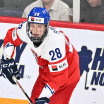When Carson Rehkopf was four years old, his grandfather gifted him with a hockey stick. The Kraken’s 2023 second-round draft choice took it from there.
“I got into it and started skating at four years old, not as early as everyone else,” said Rehkopf this week, referencing most of his teammates growing up were on skates by two years old or even younger. “I kept building, learned how to skate, wanted to play hockey, played house league, and then kept making teams and kind of surprising my parents.”
Unlike most of his teammates or pretty much any kid in Canada, Rehkopf was the first person in his family to play hockey. But his parents knew enough to relocate from Barrie, ON, to Toronto to enable their only child to play in a more competitive league. Barrie is about 70 miles north, so the family moved closer to the NHL city with his mom, Connie, working in Barrie and his father, John, in Toronto.
Rehkopf is grateful for his parents’ logistical sacrifices and makes it clear when people ask about his origin story as an NHL prospect: “[The move] was something they wanted to do and were open to doing. It definitely helped my development a lot.”
The Kitchener Rangers of the Ontario Hockey League and the team’s staunch fanbase are grateful too. Rehkopf entered this weekend of play leading the OHL in goals (12) and points (21), leading a team that is tops in the OHL Western Conference despite being a younger team that lost four star players from last season, including both of Rehkopf’s linemates that helped him score 30 goals and add 29 assists in 68 games in his draft-eligible year. Kitchener is 8-3 going into weekend play.
Rehkopf’s hot start has been more productive than all of the fellow OHL forwards selected in the 2023 draft, a league that placed 35 draft prospects overall in July. Rehkopf has scored at least one goal in eight games, including a hat trick and a pair of two-goal games. During one three-game stretch earlier this month, he racked up 11 points (7G, 4A).
There is a lot to like in Rehkopf’s size (6-foot-2, 195 pounds) combined with his power-forward skills (including a hard shot and quick release) in all zones.
Rehkopf impressed during the team’s development camp for new draft choices and ongoing prospects, then again at the NHL training camp in September.
One more piece of evidence: Rehkopf was rewarded with a chance to skate in the Kraken’s first home game this preseason and by all accounts graded out positively, highlighted by earning an assist. Getting time on ice during preseason play is not always standard operating practice for NHL prospects.
“I talked to [player development staffers] over the summer and they said that should be a goal,” said Rehkopf. “It’s not just given ... I thought I showed well. It was definitely a cool experience to come back to juniors playing a game. All of the older guys [Seattle players] were great to us.”
Rehkopf’s camp time with the Kraken and as a returning “veteran” on a juniors team with nine 16-year-olds joining the roster is a huge plus for the Kitchener club. Consider it a sort of pay-it-forward concept. With the Kitchener newcomers, Rehkopf zeroes in on taking care of your body (sleep, nutrition, conditioning) to endure the 68-game OHL season.
“Our young guys respect our older guys a lot,” said Rehkopf. “We have a pretty good group of older guys who have been around. I try to be very easy for the younger guys to talk to.
“When I was 16, I learned it's tough to kind of come into this league away from home and how demanding our schedule is. During the season, I’m just trying to make it easy for those guys to come to the rink every day and be themselves. I think it's the biggest thing and all of our young guys have been handling it well. For me now, I’m pretty comfortable. I hope that they feel the same way.”
Like all players who return to their teams after camp, Rehkopf sat down with Dave Hakstol to talk about camp and the season ahead. The message: Keep working on becoming a good pro, especially building good habits on and off the ice as a centerman, and the specific areas to improve his game. Working on his shot was one of Rehkopf’s takeaways.
“Just trying to get it off more,” said Rehkopf, “An average of 6 to 10 shots a night is something for me to work on. When I’m in that range of shots, it means I am all over the net. It means I’m playing well. I’m using my skating and shot to be a force every night.”
So far, the approach is translating to production, leadership, and a continuing success story for both Rehkopf and the Kitchener Rangers.



















